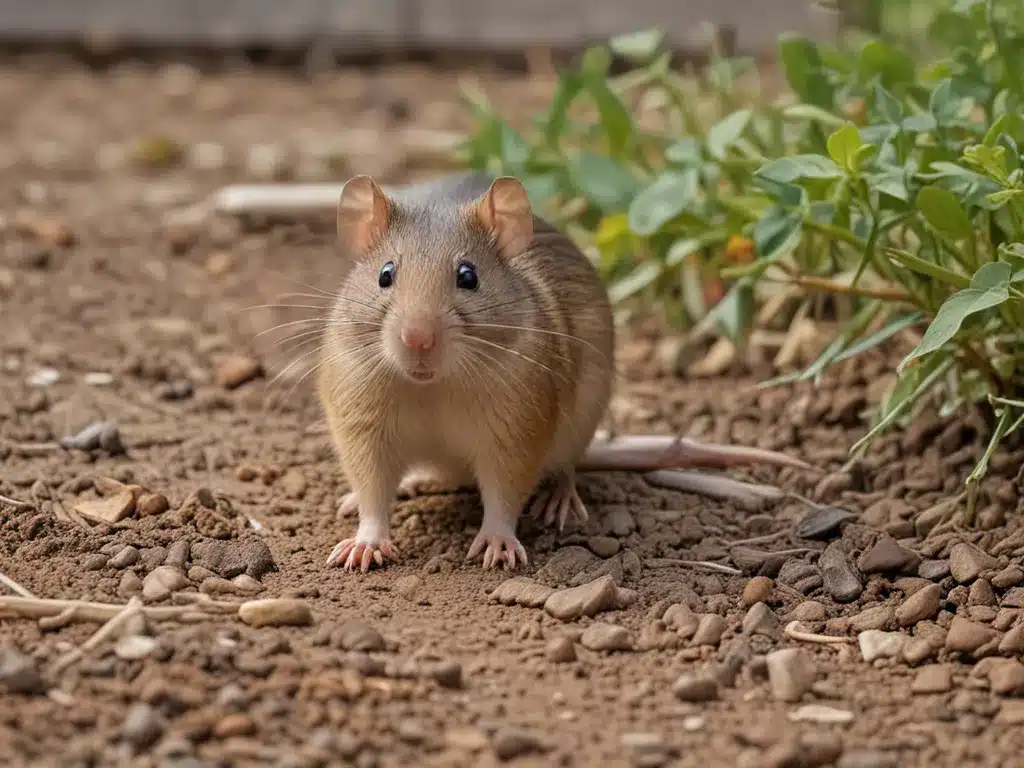Identifying Rodent Infestations
Rodents like mice, rats, squirrels, and chipmunks can easily find their way into homes. Signs of a rodent infestation include:
-
Droppings – Rodents leave behind pellet-like droppings. Mouse droppings are about the size of a grain of rice while rat droppings are larger, about the size of a raisin. I often find droppings along baseboards, in cupboards, and in the attic.
-
Rub marks – Greasy rub marks on walls indicate areas where rodents frequently travel. I look for these near baseboards, walls, rafters, and around entry points like holes.
-
Gnaw marks – Mice and rats love to chew and will leave behind gnaw marks on food packages, wood, drywall, wires, and other materials. These teeth marks help identify nesting areas.
-
Damaged materials – I inspect books, insulation, furniture stuffing, and stored paper for cuts, shreds, and tears from rodent teeth and claws.
-
Noises – I listen for scurrying, scratching, or squeaking noises coming from walls, attics, and other locations, especially at night. Rodents are most active at night.
-
Nests – Seeing shredded paper, fabric, or other material wedged into a hidden space indicates a nesting area. I search in attics, crawlspaces, cabinets, and closets when looking for nests.
-
Odors – Catching a whiff of urine or musty odors can also signal rodents. I sniff around appliances, along walls, and near entry points.
Dangers of Rodent Feces and Urine
Rodent droppings and urine pose health risks to humans. When removing rodent infestations, I take precautions to avoid direct contact with feces and urine.
Feces
– Rodent feces can contain bacteria, viruses, and parasites like Hantavirus, Leptospirosis, Salmonellosis, and Rat-bite fever that can infect humans.
- Dust containing microscopic particles of dried rodent urine and feces can be easily inhaled and lead to disease when cleaning infested areas. Wearing protective masks reduces this risk.
Urine
– Fresh rodent urine contains ammonia which is irritating and potentially damaging if it contacts skin or is inhaled. I always wear gloves when cleaning areas with fresh urine.
-
Rodent urine leaves behind a strong musty odor and attracts more rodents. Urine stains are difficult to remove from porous materials like drywall and wood.
-
Prolonged exposure to dried and decaying rodent urine can cause respiratory issues and allergic reactions in sensitive individuals. A mask helps prevent inhaling contaminants.
Safely Removing Rodents and Waste
When dealing with a rodent problem, I focus on safely eliminating the rodents, cleaning up any droppings and urine, and preventing future infestations. Here are the steps I take:
Trapping Rodents
I first trap rodents using humane traps since they do not spread contaminants like poisons can. I place numerous traps along baseboards, in entry points, and near signs of activity. Once I stop catching rodents, I know the active infestation is under control.
Ventilating Areas
Before cleaning droppings and urine, I open windows and doors to ventilate the area for at least 30 minutes. This allows any pathogens to disperse and makes the area safer to work in. I also run fans pointed towards open windows.
Wearing Personal Protective Equipment
When handling rodent waste, wearing the proper safety gear protects me from exposure. This includes:
- Dust mask or respirator
- Gloves
- Protective eyewear
- Coveralls or long sleeves/pants
Disinfecting the Area
To kill bacteria and pathogens:
- I thoroughly mop floors and wipe down surfaces with disinfectant. Bleach solutions work well for disinfection.
- I spray down dead rodents, traps, droppings, and urine with disinfectant solution before disposing. This prevents spread of contaminants.
- Ventilation and disinfection makes areas safe for continued cleaning.
Removing Droppings
To remove feces safely:
- I lightly spray droppings with disinfectant and let sit for 5 minutes. This further reduces pathogens.
- Using a paper towel, I wipe up each dropping from the disinfected area and immediately dispose in a plastic bag.
- For droppings in hard to reach areas, I apply disinfectant spray thoroughly until droppings are saturated. Then I wipe up with paper towels wearing gloves.
- I do not sweep or vacuum up dry droppings as this spreads contaminants into the air. The moisture and disinfectant prevents this.
Cleaning Urine
To handle urine, I:
- Use an enzyme-based cleaner specifically made to break down urine and remove stains and odors. I apply this thoroughly on urine stains and let sit overnight.
- The next day, I go over the area with an disinfectant cleaner. This further deodorizes and kills any remaining bacteria.
- Heavily soaked areas may need repeated enzyme cleaner applications and replacement of damaged porous materials.
Sealing Entry Points
I walk around the exterior and check the interior carefully for any holes, cracks, or gaps that may allow rodent entry. I seal openings wider than 1/4 inch with steel wool, caulk, concrete, hardware cloth, or metal flashing. This helps prevent future infestations.
Monitoring for Recurrence
I continue checking for new signs of rodent activity. If droppings reappear, I repeat the trapping process until no more rodents come into the traps. Consistent monitoring and prompt removal helps keep homes rodent-free.
When to Call a Professional
While I can handle small rodent problems myself, I call in a pest control professional for large infestations or extreme biohazard conditions. Professionals have commercial products, proper equipment, and extensive experience managing significant rodent and biohazard issues. They can fully sanitize the premises and stop major infestations. For severe rodent contaminations, professionals can best mitigate risks and properly rid the home of rodents and waste.
By identifying signs of infestation early, wearing protective gear, disinfecting properly, and sealing entry points, I can safely and effectively remove rodents and their waste from homes. Consistent monitoring and prevention helps protect my family’s health from the serious risks of rodent droppings and urine. Calling in professional help for severe infestations provides peace of mind knowing the home







